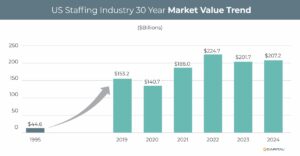
Navigating Slow Growth: What Staffing Companies Need to Know
Content
Over the past three decades, the temporary help services industry has grown at an impressive pace from $44.6 billion in 1995 to $224.7 billion in 2022. However, in an unsettling reverse of trends, the number of temporary workers supplied via staffing agencies has steadily declined since June 2022. As of May 2024, employment dropped by 6.5% from the previous year and 14.2% from its peak in March 2022. Excluding the pandemic dip in 2020, the number of temporary help services jobs has not been this low since April 2014, roughly a decade ago.
Despite the recent downturn, an industry insights report presented by the SIA cites reasons for optimism. The industry has proven exceedingly resilient over the past century, surviving economic cycles and a variety of technology evolutions, including the advent of AI. As new cycles and disruptions evolve, industry analysts expect staffing firms to evolve their operations accordingly as they continue to innovate to offer the talent solutions required by today’s employers.
Learn how industry growth is expected to change in 2024 and 2025 and how to manage business financing throughout challenging economic conditions to remain stable and grow.
A look in the rear mirror – what happened?
By 2022, the US temp staffing industry had surged to unsustainable levels, driven by a decade of economic expansion and $5 trillion in federal rescue spending during the pandemic. This rapid growth, reaching $224.7 billion, was set for a pullback as the temporary staffing boom was not sustainable.
In the wake of its historic peak, the US staffing industry has experienced a decline for 23 of the past 24 months. In the first quarter of 2024 alone, the staffing industry lost 186,000 jobs, a decline of 7.7% from 4Q23 to 1Q24. However, analysts anticipate that interest rate cuts could stimulate growth in the latter half of the year.
What’s driving the downturn?
Given the staffing industry’s integration across almost every sector, growth and decline dynamics differ widely depending on the skill segment and client industry. Nonetheless, has identified a handful of overarching factors useful in understanding the recent decline in temp staffing.
Unsustainable Levels: From 2010 to 2019, the US experienced a historic ten-year economic expansion, during which temporary staffing grew steadily. Although the pandemic in 2020 caused disruptions and lockdowns, the $5 trillion in federal rescue spending unexpectedly accelerated the labor market, driving the staffing industry to reach $224.7 billion by 2022.
This trend was most pronounced in healthcare staffing, where growth surged due to a strong economy and in response to the critical demand for healthcare clinicians during the pandemic. Since 2022, demand for travel nurses has been gradually returning to pre-pandemic levels.
Decline in key client industries: Manufacturing and transportation/warehousing are two major sectors with high demand for temporary workers. Both have experienced stagnation or decline over the past two years. Although the industrial and office/clerical segments make up only 29% of the staffing industry’s revenue, they represent about two-thirds of all temporary workers on any given day.
Economic uncertainty: High interest rates decrease the net present value of projects, investments, and company valuations, leading businesses to cancel or delay projects and hiring. Economic uncertainty has prompted many staffing clients to cut expenses, pause, or cancel projects. IT staffing, in particular, has faced challenges due to its sensitivity to high interest rates. This has led to layoffs at large technology companies that over-hired during the pandemic and to a general pullback in demand for IT staffing.
Increased costs: The labor shortage has increased the cost of temporary workers. Previously, companies could easily tap into a pool of candidates, often from the ranks of the unemployed, who were willing to take temporary positions for lower pay. However, this supply has diminished due to declining birth rates, stagnant levels of legal immigration, the retirement of the baby boom generation, and rising demand for specialized skills. Consequently, the higher cost of temporary workers has led clients with fixed-budget projects to either reduce their use of temporary staff or explore alternatives such as hiring full-time employees or adopting automation solutions.
The rise of alternatives: Options to traditional temporary staffing – such as SOW (statement-of-work) consultants, freelancers, independent contractors, and direct sourcing by employers – are leading to a decline in temporary help employment. These contingent work models represent an evolution of traditional temporary staffing. They are being provided by both innovative startups and established staffing firms that have either added these services or shifted their core offerings.
Reasons for optimism in the staffing industry
While the industry experiences a decline after a sustained period of growth, the staffing industry’s long-term future looks sound.
- Strong Demand Base: The widespread adoption of contingent workforce programs by many of the largest, innovative companies creates a robust demand for temporary staffing. Surveys indicate that these companies expect their contingent workforce to remain stable or grow over the next decade.
- Shift to Remote Work: Accelerated by the pandemic, remote work has reduced the reliance on local labor markets, allowing employers to access talent nationwide or globally. This shift enhances the value of staffing firms capable of sourcing and delivering talent from a broad geographical range.
- Development of Platform Technology: Advances in staffing platform technology offer improved self-service and automation for candidates and clients, enhancing convenience and user experience. This technological progress expands the market reach of staffing firms.
- Growth and Complexity of Workforce Technology: The rapid evolution and increasing complexity of staffing and talent acquisition technologies heighten the value of staffing firms adept at utilizing the latest recruiting strategies and technologies. Clients may find it more challenging to maintain cutting-edge in-house capabilities and are thus more likely to outsource these functions to specialized staffing providers.
What are the projections for 2024 and 2025?
Analysts predict the US staffing industry will grow 1.3% in 2024 and 2.1% in 2025. Additionally, 91% of staffing leaders believe their firms will grow in 2024 with many targeting a 10-20% increase.
Managing Financial Stability
The current downturn is striking given it follows a decade of US economic expansion (2010-2020) and a pandemic-driven boom (2021-2022). Many staffing professionals and startups that entered the industry in the past fifteen years have only experienced it during periods of growth. For many, sustaining financial stability in a declining or low growth environment presents new challenges in meeting payroll, preserving profits, and taking advantage of growth opportunities.
In these uncertain times, payroll funding is becoming a crucial strategy for maintaining financial stability and resilience. Whether structured as an invoice factoring facility or asset-based lending (ABL), payroll funding offers crucial access to working capital and credit, supporting businesses through growth, downturns, and market fluctuations.
Conclusion
Since mid-2022, the industry has faced a decline, with temporary staffing jobs dropping by 6.5% in May 2024 compared to the previous year and 14.2% from its peak in March 2022. Key factors driving this downturn include unsustainable growth levels, stagnation in key client industries like manufacturing and transportation, economic uncertainty, rising labor costs, and the rise of alternative staffing models.
Despite these challenges, there are several reasons for optimism, such as strong demand from large companies, the shift to remote work, advancements in staffing technology, and the growing complexity of workforce technology.
Analysts project modest growth for the staffing industry in 2024 and 2025, and payroll funding is emerging as a crucial strategy for maintaining financial stability and resilience during these uncertain times.
Contact us to request a free financing consultation and see what eCapital can do to maximize your staffing firm’s financial stability and ability to grow.
Key Takeaways
- Temporary staffing jobs have steadily declined since June 2022.
- Despite the recent downturn, the most recent SIA industry insights report cites optimism exists due to strong demand, remote work trends and technology advancements.
- The industry is projected to experience moderate experience moderate growth with 91% of staffing leaders believing their firms will grow in 2024, many targeting a 10-20% increase.
- For many, difficulties sustaining financial stability in a declining or low growth environment presents new challenges in meeting payroll, preserving profits, and taking advantage of growth opportunities as they arise.
- Payroll funding is becoming a key strategic investment for maintaining financial stability and supporting growth.
ABOUT eCapital
At eCapital, we accelerate business growth by delivering fast, flexible access to capital through cutting-edge technology and deep industry insight.
Across North America and the U.K., we’ve redefined how small and medium-sized businesses access funding—eliminating friction, speeding approvals, and empowering clients with access to the capital they need to move forward. With the capacity to fund facilities from $5 million to $250 million, we support a wide range of business needs at every stage.
With a powerful blend of innovation, scalability, and personalized service, we’re not just a funding provider, we’re a strategic partner built for what’s next.



